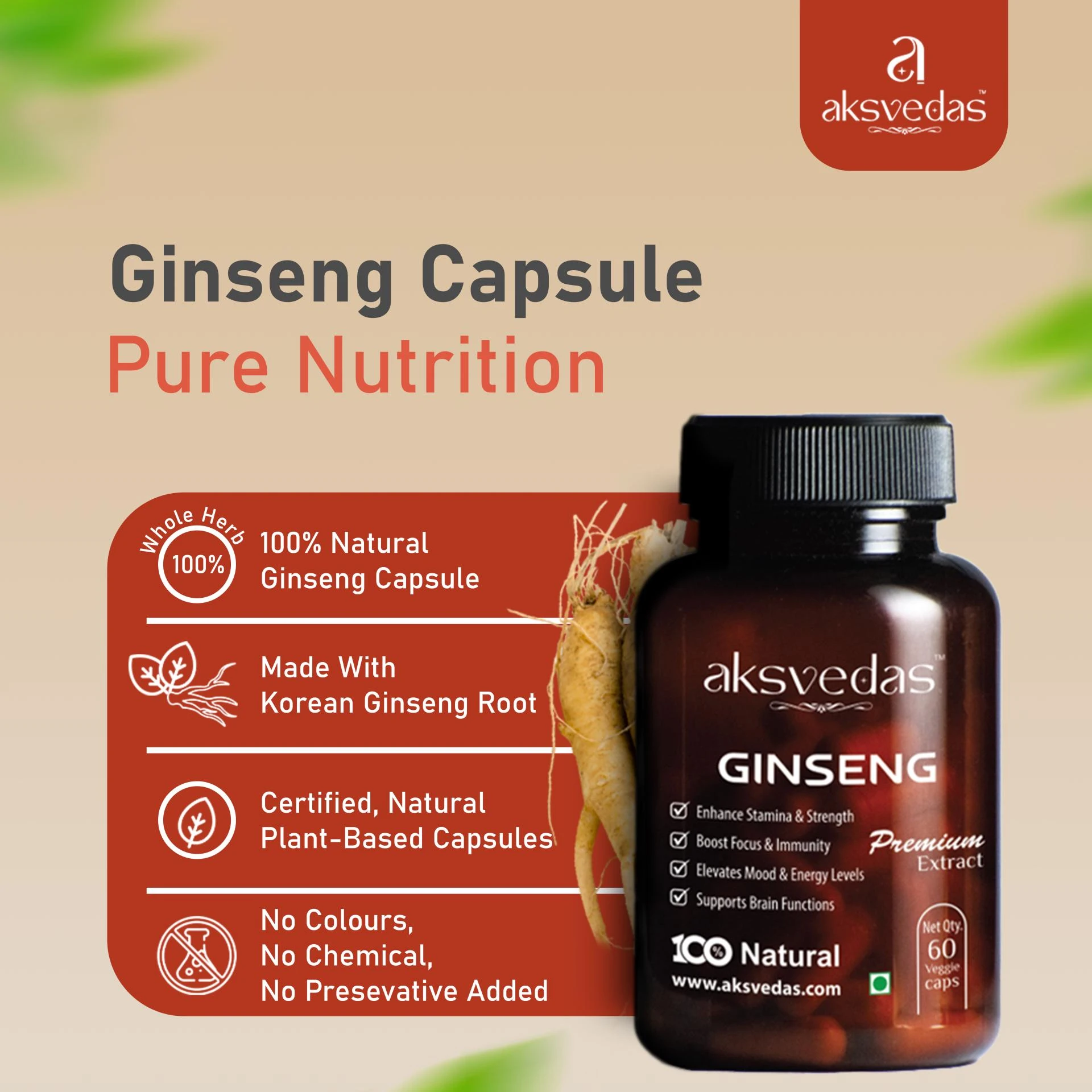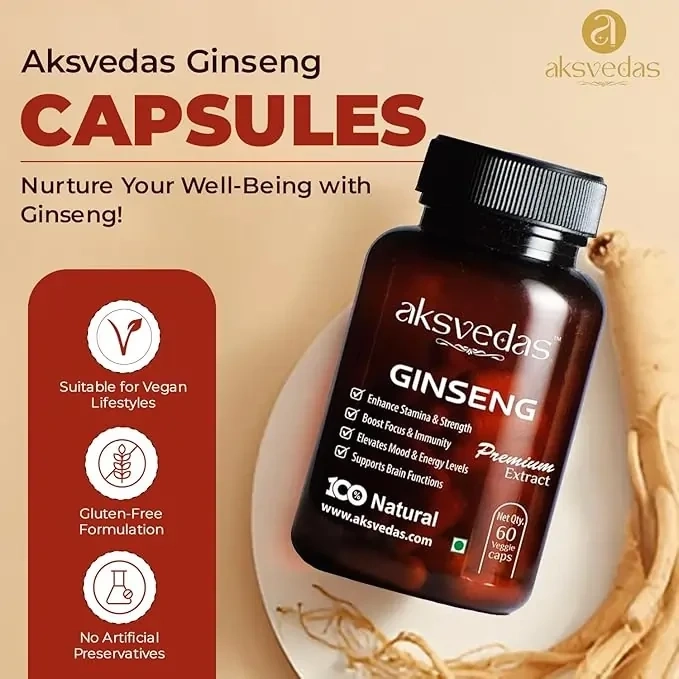Ginseng has earned a reputation as one of the most revered herbal remedies in traditional medicine, especially in Eastern cultures. For centuries, it has been used to boost energy, strengthen immunity, enhance mental clarity, and support overall vitality. But as this ancient herb finds its way into modern lifestyles, it often comes in more convenient forms—most commonly tablets or capsules. This brings up an important question: Is ginseng in tablet form as effective as the raw root?
Let’s explore both forms of ginseng, their differences in efficacy, absorption, convenience, and how to decide which is right for you.

What is Ginseng?
Ginseng refers to the roots of plants belonging to the Panax genus, especially Panax ginseng (Asian or Korean Ginseng) and Panax quinquefolius (American Ginseng). Both types contain bioactive compounds known as ginsenosides, which are believed to be responsible for most of its health benefits
Ginseng is an adaptogen, meaning it helps the body adapt to stress, supports mental and physical endurance, and improves overall balance.
Ginseng Root: The Traditional Powerhouse
Pros:
- Unprocessed & Natural: Ginseng root is the most natural form, with no additives or preservatives. It can be consumed raw, brewed into teas, or cooked with food.
- Cultural Tradition: In many Eastern healing traditions, the ritual of preparing and consuming ginseng root is part of the therapeutic experience.
- Varied Use: Raw ginseng offers flexibility—you can slice, boil, or chew it. This is ideal for people who want to control the dosage or create custom remedies.
Cons:
- Preparation Required: Consuming the root takes time. It often needs to be soaked, sliced, or cooked.
- Inconsistent Dosage: The potency of raw ginseng can vary depending on age, part of the root, and how it’s prepared.
- Short Shelf Life: Unlike tablets, raw ginseng can spoil or degrade over time if not stored properly.
Ginseng Tablets: Convenience Meets Consistency
Pros:
- Standardized Dosage: Tablets often come with a precise amount of active ingredients, making it easier to control how much you take.
- Ease of Use: Tablets are portable and easy to incorporate into a daily routine—no brewing or prepping required.
- Better Shelf Stability: Tablets have a longer shelf life and are less prone to spoilage.
Cons:
- Possible Additives: Some tablets may include binders, fillers, or other ingredients that dilute the ginseng extract.
- Processing Losses: The manufacturing process may slightly reduce the potency of the ginsenosides, depending on how it's made.
Effectiveness: Root vs. Tablet
Bioavailability
Bioavailability refers to how well your body can absorb and use a substance. Some studies suggest that standardized ginseng tablets offer similar bioavailability to properly prepared ginseng root, particularly if the tablet contains a concentrated extract.
However, the freshness and preparation of the raw root can sometimes provide slightly higher potency in natural ginsenosides. The downside is the inconsistency—two slices from the same root may not have the same potency.
Clinical Studies
Many clinical trials examining the benefits of ginseng—such as energy improvement, immune function, and stress response—use standardized ginseng extracts in tablet or capsule form.
That means much of the scientific evidence supporting ginseng’s benefits is based on the use of supplements, not the raw root.
That said, traditional usage of ginseng root across centuries supports its efficacy, even without modern clinical validation.
Safety and Side Effects
Both ginseng root and ginseng tablets are generally considered safe when taken as directed. However, consuming ginseng in very high amounts—regardless of form—can cause side effects like:
- Insomnia
- Headache
- Digestive issues
- Rapid heartbeat (in rare cases)
People with high blood pressure, hormone-sensitive conditions, or those on certain medications should consult a healthcare provider before taking ginseng.
When to Choose Ginseng Root
Choose raw ginseng root if:
- You enjoy preparing your own herbal remedies.
- You want the most natural form possible.
- You are experienced with traditional medicine and know how to use it correctly.
Raw ginseng is often preferred by herbalists or people who value traditional wellness practices. It’s also ideal for making therapeutic teas or soups.
When to Choose Ginseng Tablets
Choose ginseng tablets if:
- You want a convenient, on-the-go supplement.
- You prefer precise, measurable doses.
- You are using ginseng as part of a structured wellness routine (e.g., for stress, energy, or immunity).
For most modern users, ginseng tablets offer an easy and effective solution, especially when sourced from reputable brands with clear dosage and third-party testing.
Final Verdict: Which Is More Effective?
Both ginseng root and ginseng tablets are effective, but they serve different needs. The root offers purity and tradition, while the tablet offers precision and convenience.
If you're someone who appreciates the hands-on, ritualistic aspect of herbal preparation, go for the root. But if you're looking for a more structured and efficient way to reap the benefits of ginseng, tablets are likely the better choice.
What matters most is quality—whether it's a root or a tablet, ensure it's derived from high-quality Panax ginseng, grown in a clean environment, and prepared without harmful additives.
Conclusion
Ginseng, in all its forms, is a powerful ally in supporting energy, focus, and resilience. Whether you choose the ancient wisdom of the root or the modern convenience of a tablet, the key is to choose pure, potent, and responsibly sourced ginseng that aligns with your health goals and lifestyle.


